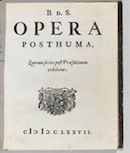
Selection from –Political Treatise - Chapter III, of the right of supreme authorities (Page 4)
Spinoza's Words – (religion should be free from civil authority)
 Now before I treat of the right of the said authorities as against others, we had better resolve a question commonly mooted about religion.
Now before I treat of the right of the said authorities as against others, we had better resolve a question commonly mooted about religion.
For it may be objected to us, Do not the civil state, and the obedience of subjects, such as we have shown is required in the civil state, do away with religion, whereby we are bound to worship (Deus sive Natura)?
But if we consider the matter, as it really is, we shall find nothing that can suggest a scruple. For the mind, so far as it makes use of reason, is dependent, not on the supreme authorities, but on itself. And so the true knowledge and the love of (Deus sive Natura) cannot be subject to the dominion of any.
And if we further reflect, that the highest exercise of charity is that which aims at keeping peace and joining in unity, we shall not doubt that he does his duty, who helps everyone, so far as the commonwealth's laws, that is so far as unity and quiet allow.
As for external rites, it is certain, that they can do no good or harm at all in respect of the true knowledge of (Deus sive Natura), and the love which necessarily results from it; and so they ought not to be held of such importance, that it should be thought worth while on their account to disturb public peace and quiet.
Moreover it is certain, that I am not a champion of religion by the divine decree. Everyone therefore, wherever he may be, can worship (Deus sive Natura) with true religion, and mind his own business, which is the duty of a private man.
Comment:
Spinoza throws in a short digression on the need for the civil state to provide freedom for religious choice. In the name of free reason he sees the mind independent of authority on this subject. In the name of peace and tranquility the practice of religious charity will bring them about. Public religious practices, or rites, are not harmful or even meaningful. He identifies himself as a disbeliever in organized religion but is tolerant of believers as long as they "mind their own business."